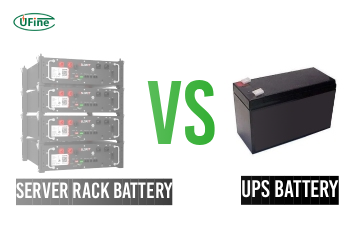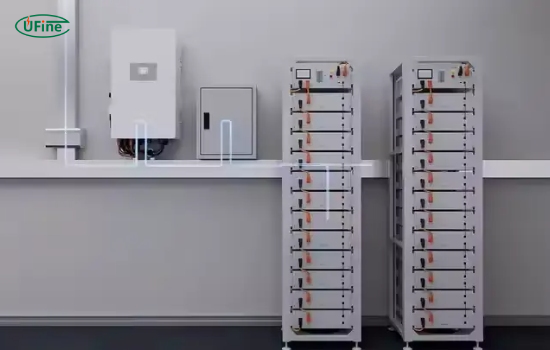
- Part 1. What is a server rack battery?
- Part 2. Why choosing the right server rack battery matters?
- Part 3. How to calculate your power needs?
- Part 4. What server rack battery capacity should you look for?
- Part 5. How temperature affects server rack battery performance?
- Part 6. Should you choose lithium-ion or lead-acid server rack battery?
- Part 7. How to evaluate server rack battery battery lifespan and cycles?
- Part 8. Why server rack battery brand reputation and support matter?
- Part 9. Key safety features to look for in a server rack battery
- Part 10. When to consider a custom server rack battery solution?
- Part 10. FAQs about choosing the server rack battery
Choosing the right server rack battery is essential for keeping your data center running smoothly. Whether you manage a small server room or a large-scale facility, the battery you select can directly affect uptime, performance, and safety. So, how to choose server rack battery that fits your power needs and environment? Let’s walk through everything you need to know to make the best decision.
Part 1. What is a server rack battery?
A server rack battery is a rechargeable energy storage unit designed to fit seamlessly into a standard server rack. These batteries provide backup power when the main supply fails, ensuring that your servers remain operational without any disruptions.
They are commonly used in data centers, IT rooms, and communication facilities to protect sensitive equipment from data loss and downtime. Unlike traditional UPS systems, server rack batteries are more compact, scalable, and often more energy-efficient.
Part 2. Why choosing the right server rack battery matters?
Choosing the best server rack battery directly impacts the reliability and efficiency of your IT infrastructure. The wrong battery may not provide adequate runtime or may fail under high temperatures. Worse, it could shorten the life of your equipment or cause costly downtime.
By selecting a battery that matches your power capacity, load demands, and operating environment, you ensure peace of mind and long-term savings.
Part 3. How to calculate your power needs?
How do I know which battery size I need for my data center?
Start by calculating the total power consumption of your equipment in kilowatts (kW). Add a 20–30% buffer to account for future growth and unexpected spikes. Once you know the power load, determine how long you need the battery to last during an outage. Multiply the total load (in kW) by the desired runtime (in hours) to find the required kilowatt-hours (kWh).
Example:
If your server rack consumes 5 kW and you need 2 hours of backup, the required capacity is:
5 kW × 2 hours = 10 kWh
This calculation is your baseline for choosing the appropriate battery size.
To simplify your battery sizing process, use the calculators below. They’ll help you determine total energy (kWh) and the ideal battery capacity (Ah) for your data center.
Part 4. What server rack battery capacity should you look for?
Battery capacity is usually measured in kWh or Ah (ampere hours). For rack-mounted batteries, look for modular systems that can scale easily. Lithium-ion batteries, in particular, are ideal due to their high energy density and longer cycle life.
Make sure to compare capacities across different brands, and check if the battery can support parallel connections to expand capacity as your needs grow.
Part 5. How temperature affects server rack battery performance?
Why is temperature important when choosing a server rack battery?
Temperature plays a major role in battery performance and lifespan. Most batteries are rated for optimal operation between 20°C and 25°C (68°F to 77°F). Operating in extreme heat or cold can reduce capacity and shorten the battery’s life.
If your data center is in a location with challenging climate conditions or poor cooling, choose a battery with a wide temperature tolerance. Batteries with built-in thermal management systems are also ideal for such environments.
Part 6. Should you choose lithium-ion or lead-acid server rack battery?
While both types are used in server environments, lithium-ion batteries are fast becoming the standard in modern data centers.
Comparison:
| Feature | Lithium-ion | Lead-acid |
|---|---|---|
| Energy Density | High | Low |
| Lifespan | 8-15 years | 3-5 years |
| Maintenance | Low | High |
| Size & Weight | Compact | Bulky |
| Cost | Higher upfront | Lower upfront |
If you’re managing a server rack battery for small data center, lithium-ion may seem expensive initially, but the total cost of ownership is often lower over time.
Part 7. How to evaluate server rack battery battery lifespan and cycles?
Battery life is measured in charge/discharge cycles. A good server rack battery should offer at least 3,000 to 6,000 cycles at 80% depth of discharge. Depth of discharge (DoD) refers to how much of the battery’s capacity is used before recharging.
Choosing a battery with a long cycle life reduces replacement costs and ensures consistent performance.
Part 8. Why server rack battery brand reputation and support matter?
Not all batteries are created equal. When selecting the best server rack battery, prioritize manufacturers with proven reliability, warranty support, and customer service. A well-known brand often offers:
- Better quality control
- Certifications and compliance
- Reliable technical support
- Future firmware updates
- Long-term availability of spare parts
Also, check for reviews, case studies, and real-world deployments.
Part 9. Key safety features to look for in a server rack battery
Safety should never be compromised. Look for these essential features:
- Overcharge and over-discharge protection
- Thermal runaway prevention
- Short-circuit protection
- Battery Monitoring System (BMS)
- Fire-resistant enclosure
A reliable BMS monitors each cell’s voltage, temperature, and current to prevent dangerous failures.
Part 10. When to consider a custom server rack battery solution?
Absolutely. No two data centers are the same. If your environment has unique power needs, space constraints, or climate challenges, a customized server rack battery solution may be your best option.
Customized batteries can:
- Fit into irregular rack sizes
- Handle specific temperature ranges
- Include remote monitoring capabilities
- Match required voltage or runtime profiles
For tailored solutions, companies like Ufine offer advanced custom battery design services to meet specific business needs.
Part 10. FAQs about choosing the server rack battery
What is the best server rack battery for small data centers?
The best option for small data centers is typically a modular lithium-ion battery with scalable capacity. It should offer high energy density, long cycle life, and remote monitoring features.
How long do server rack batteries last?
Depending on the type and usage, server rack batteries can last 3 to 15 years. Lithium-ion batteries usually last longer than lead-acid alternatives.
Can I use home batteries for server racks?
No. Home batteries lack the industrial-grade features, rack compatibility, and safety systems required for data center use. Always use batteries designed for server environments.
How do I monitor my server rack battery?
Modern server rack batteries come with Battery Management Systems (BMS) that allow remote monitoring of voltage, temperature, and charge status. Some also integrate with existing data center management platforms.
Is it worth investing in a higher-capacity battery?
Yes, if you anticipate future growth or want longer runtime. A higher-capacity battery gives you more flexibility and reduces the risk of power-related downtime.
For businesses seeking customized energy solutions, explore Ufine’s Custom Battery Solutions to get tailored, high-efficiency power options built to your data center’s specific requirements.
Related Tags:
More Articles

Server Rack Battery vs UPS Battery: What’s the Difference
Discover the difference between server rack and UPS batteries. Compare design, chemistry, performance, and maintenance to select the best data center backup.
What Is a Server Rack Battery? A Complete Guide for Data Centers and IT
Discover what a server rack battery is, how it works, and why it’s essential for reliable data center and IT power backup. Learn key features and benefits.
Understanding the Difference Between AA and AAA Batteries
Wondering about the difference between AA and AAA batteries? Learn the key differences, similarities, and when to use each in this detailed guide.
3S LiPo Batteries Explained – How to Pick the Best 3S Battery
This guide includes 3S voltage charts, capacity options, life, safety rules, and top recommended batteries — so you can choose the best 3S LiPo battery.
The Ultimate Guide to C Type Battery
What is a C type battery? Discover sizes, types (alkaline/NiMH/lithium), vs AA/D batteries, top uses, and where to buy the best C batteries for your devices.



